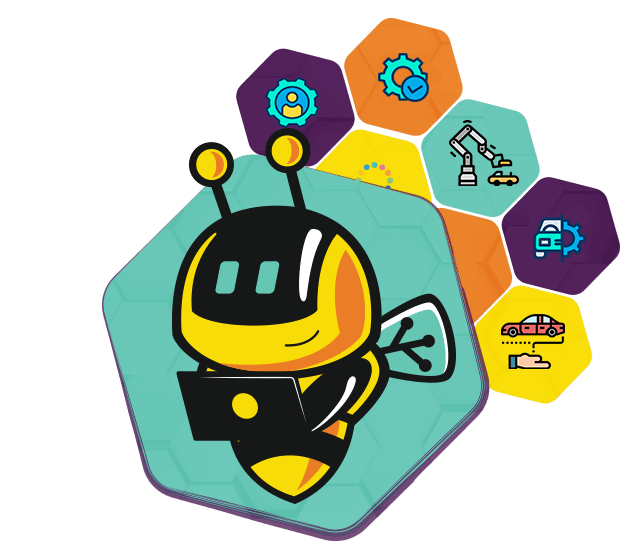- Overview:
The automotive industry is one of the most significant and rapidly evolving industries in the world, with innovation and technological advancements driving major changes across the entire sector. One of the most significant changes in recent years has been the increased adoption of automation, which has helped to transform the industry in many ways.
Automation in the automotive industry involves the use of machines, robots, and computer systems to perform tasks that were previously performed manually. Automation has had a significant impact on many areas of the automotive industry, including manufacturing, customer service, fleet management, and more.
The automotive industry has also been revolutionized by technological advances, particularly in automation. One of the areas where our automation has had a particular impact is in improving the customer experience, especially in the following use cases:
2. Solutions:
Service scheduling: customers can now access custom business apps that allow them to easily schedule service appointments, either online or via mobile devices. This reduces time spent on phone calls and paperwork and ensures appointments are made in real-time. Not only does this save valuable time for customers, but it also ensures that appointments are made in real-time, reducing the chances of missed appointments or scheduling conflicts. By utilizing this service scheduling feature, businesses can improve their customer satisfaction and ultimately increase their revenue.
Access to vehicle data: Our custom business apps provide customers with valuable access to their vehicle data. By simply logging into the app, customers can view their vehicle’s diagnostic codes and maintenance history. This allows them to take a proactive approach to vehicle maintenance and make informed decisions about necessary repairs or upgrades. With this feature, customers can keep track of their vehicle’s health, and avoid unexpected breakdowns or costly repairs. Providing customers with easy access to this information not only benefits the customer but also helps businesses improve their reputation and customer loyalty.
Fleet management: Our custom business apps allow companies to track their vehicles’ usage, maintenance history, and fuel consumption in real-time. This feature helps companies to make data-driven decisions about their fleet and ensure that their vehicles are operating at optimal levels. Additionally, companies can use this information to reduce costs by identifying areas for improvement, such as reducing fuel consumption or improving maintenance schedules. This improved efficiency not only saves companies money but also helps them operate in a more sustainable manner, ultimately benefiting both the company and the environment.
Another way automation has been used in the automotive industry is to integrate customer relationship management (CRM) systems. These systems provide a centralised platform for managing customer interactions, allowing consolidation of data from multiple sources. This integration has enabled companies to gain a better understanding of customer needs and preferences, allowing them to tailor their approach to each individual customer.
For example, if a customer has a history of preferences for a particular type of vehicle, companies can quickly access this information and tailor their approach accordingly. In addition, if a customer prefers to communicate via email instead of phone calls, companies can adapt to this preference, resulting in a better customer experience.
– Another example of how CRM systems have been beneficial is in customer contact. Companies can use these systems to send customers automated reminders for upcoming service appointments, follow-up visits and vehicle maintenance needs. This has reduced the number of missed appointments and improved customer satisfaction.
In addition, CRM systems have allowed companies to analyze customer data and identify trends that can be used to improve overall customer satisfaction. For example, if a particular vehicle feature was particularly popular with customers, companies can use this information to develop best practices that can be shared across the organization.
Our automation technologies also play a key role in the automotive industry. For example, we have been able to automate manufacturing processes, which reduces production times and improves vehicle quality. In addition, automation can be used to simplify administrative tasks such as invoicing and order processing.
We have developed automation that can also be used to simplify administrative tasks such as invoicing and order processing. Our automation technologies help companies in the automotive industry automate these processes, reducing the time and effort required to complete these tasks. This frees up valuable time for employees to focus on other important tasks, such as customer service and product development.
Automation technologies can also be used to improve safety in the automotive industry. For example, we have developed automated systems that can detect and respond to safety hazards on the production line, preventing accidents and injuries.
Our automation technologies can also help companies in the automotive industry improve the efficiency of their operations. For example, we have developed automated systems that can track inventory levels and reorder supplies when needed, reducing waste and improving supply chain management. We’ve also developed automated systems that can monitor equipment performance, identifying potential problems before they become major issues.
Another significant benefit of automation in the automotive industry is the reduction of errors and delays. Automated processes eliminate the need for manual data entry, which can reduce the risk of errors and delays in processing.
3. Results:
Overall, automation has had a significant impact on the automotive industry, improving efficiency, safety, and the customer experience. As technology continues to evolve, it is likely that we will see even more advanced forms of automation in the automotive industry in the future.

